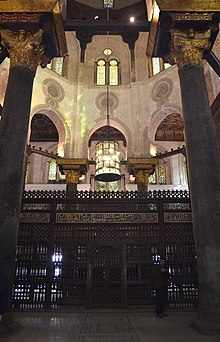| al-Manṣūr Qalāwūn | |
|---|---|
al-Malik al-Manṣūr
| |
 | |
| Sultan of Egypt | |
| Reign | November 1279 – 10 November 1290 |
| Predecessor | Solamish |
| Successor | al-Ashraf Khalil |
| Born | c. 1222 |
| Died | November 10, 1290 (aged 67–68) Cairo, Egypt |
| Burial | |
| Consort |
|
| Issue |
|
| Royal name | الملك الْمَنْصُور سيف الدّين قَلَاوُونَ بن عبد الله الألفي العلائي الصَّالِحِي |
| House | Qalawunid dynasty |
| Dynasty | Bahri Mamluks |
| Religion | Sunni Islam |
Qalāwūn aṣ-Ṣāliḥī (Arabic: قلاوون الصالحي, c. 1222 – November 10, 1290) was the seventh Turkic Bahri Mamluk sultan of Egypt; he ruled from 1279 to 1290. He was called al-Manṣūr Qalāwūn (المنصور قلاوون, "Qalāwūn the Victorious").[1] After having risen in power in the Mamluk court and elite circles, Qalawun eventually held the title of "the victorious king" and gained de facto authority over the sultanate. He is the founder of the Qalawunid dynasty that ruled Egypt for over a century.
The current sultan, Barakah was exiled and rumored to have been poisoned by Qalawun. He would then wage war against the Crusaders, capturing lands held by the County of Tripoli, and later totally defeating them in 1289. Acre, a major Crusader stronghold was besieged by Qalawun but would only be taken by his son al-Ashraf Khalil as the former died before the siege was won in 1291. His son Khalil succeeded him as sultan.
- ^ Rabbat, Nasser O. (2021). The Citadel of Cairo. Brill. p. 136. ISBN 978-90-04-49248-6.
When Qalāwūn assumed the throne in 1280, he took the regnal title al-manṣūr (the victorious).